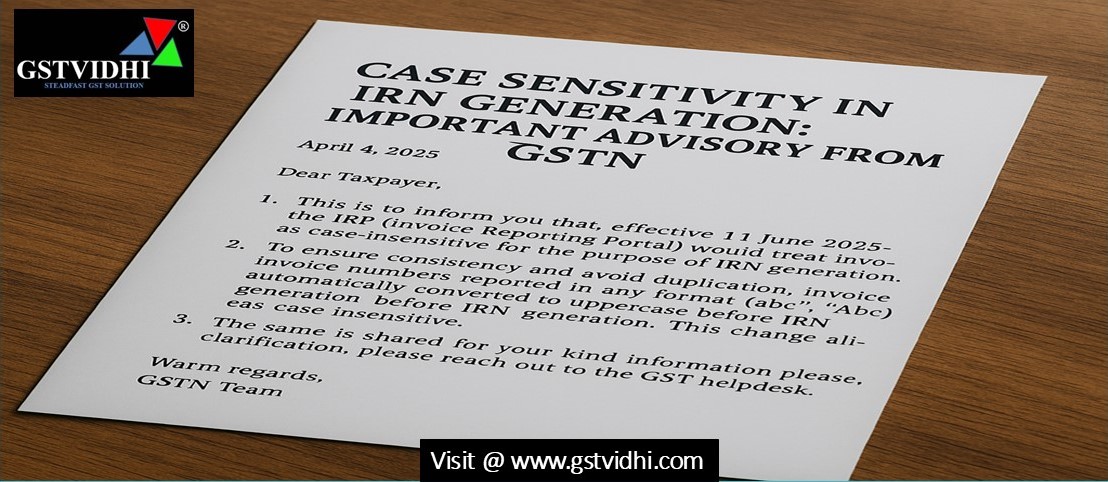
E Invoice Changes effective from 01.06.2025 / Case Sensitivity in
IRN Generation: Important Advisory from GSTN
Date of Advisory:
April 4, 2025
Effective Date of Change: June 1, 2025
Issued By: Goods and Services Tax Network (GSTN)
Introduction
With the increasing
adoption of e-invoicing under GST, the consistency and accuracy of invoice data
have become critical. To address issues related to invoice number duplication
and to bring uniformity with existing GST returns, the GSTN has released an important
advisory regarding the case sensitivity of invoice/document numbers
during IRN (Invoice Reference Number) generation.
What Has Been Announced?
Starting June 1, 2025,
the Invoice Reporting Portal (IRP) will treat invoice numbers as
case-insensitive for the purpose of IRN generation.
This means:
- Invoice numbers like “abc”, “ABC”,
and “Abc” will be considered identical.
- All invoice/document numbers
submitted to the IRP will be automatically converted to uppercase
before IRN generation.
Objective Behind This
Move
This update is aligned
with the current behavior of GSTR-1, which already treats invoice
numbers as case-insensitive. The primary objectives of this move are:
1. Uniformity:
Ensure consistent treatment of invoice numbers across all GST platforms.
2. Avoid
Duplication: Prevent duplicate IRNs from being
generated due to different cases in invoice numbers.
3. Ease
of Compliance: Simplify reconciliation of invoices
between IRP and GSTR-1.
Illustration
Let’s say a business
issues invoices with the following numbers:
- Invoice No. 001/abc
- Invoice No. 001/ABC
- Invoice No. 001/Abc
Before June 1, 2025:
All three may have been treated as different due to case variation.
After June 1, 2025:
All will be treated as “001/ABC”, i.e., converted to uppercase
before generating IRN.
As a result, only the
first invoice will get a valid IRN, and subsequent attempts with the same
characters (regardless of case) will be rejected as duplicates.
Impact on Taxpayers
1. System Adjustments
Businesses using
automated accounting or ERP software must ensure that:
- Invoice numbers are case-consistent.
- Duplicate checks consider uppercase
formats.
2. Avoid Rejections
Inconsistent casing in
invoice numbers can now lead to IRN generation failures due to perceived
duplication.
3. Best Practice
Recommendation
- Always use uppercase
for invoice/document numbers.
- Update billing software and ensure
internal teams are informed of this change.
Conclusion
This is a minor yet
impactful change in how the IRP handles invoice numbers. By treating them
as case-insensitive and converting them to uppercase, the GSTN is moving
towards a more robust and standardized system.
Taxpayers are advised to take
proactive steps before June 1, 2025, to align their systems with this
update and avoid disruptions in IRN generation.
Disclaimer: All the Information is based on the notification, circular and order issued by the Govt. authority and judgement delivered by the court or the authority information is strictly for educational purposes and on the basis of our best understanding of laws & not binding on anyone.
Click here